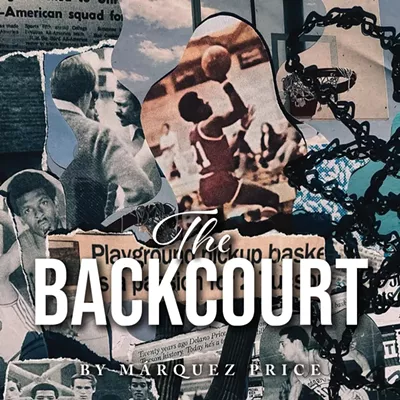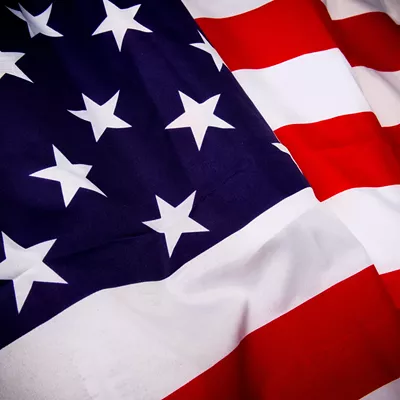I had just met Ben the day before and damn near fell in love. Public records might say he's 89, but he could pass for 65, and he acts like he's 17. He's a spinner of yarns, outrageous and melancholy, tales in which fact and fiction merge seamlessly, leaving the listener fascinated and skeptical, bewildered and aghast, all at the same time. After one story ended with an overly obvious zinger, I told him he ought to have brown eyes, because he's definitely full of crap.
When I met him, he was sitting at the executive terminal of the Tucson International Airport, cane in hand and verbal whopper file all queued up. He was there for the arrival of the Liberty Belle, a meticulously restored World War II-era B-17 bomber. The Liberty Belle project takes the plane around the country, offering rides to paying customers and preserving American history as it goes.
As a pilot, Ben flew 31 missions over Germany in a B-17. As the media folks waited for the plane to arrive, Ben held court with the TV crews. He warned them that when the four engines started up, each would start with a bang. He claimed that he was so terrified of those loud bangs that he never actually started an engine in his life. (Believability factor: sub-George W. Bush.)
So he's telling this story about how during flight training, he first pretended he didn't know where the starter switches were, and then how he put mercurochrome (how's that for a dated reference?) on a fake bandage on his finger so he wouldn't have to turn the switches on. He went on to claim that he would go down to the bomb-bay area of the plane and have the co-pilot start the engines before taking his seat in the captain's chair. The TV crews were hanging on his every word, but then I noticed another B-17 veteran, off in the corner, just about biting a hole in his lip to keep from busting out laughing.
When the first group of media people went on the flight, I stayed behind with Ben and implored him to dial it back to Mostly True. He told me that he was born on a farm in rural Iowa and lived a hardscrabble life. When the war broke out, the Army Air Corps, in its infinite wisdom, decided to make him a bomber pilot. He took his flight training in Phoenix, which had to be delightful in those pre-air-conditioning days. Something about Arizona got under his skin, and he told himself that if he made it through the war, he'd come back someday.
In his first few missions, he didn't know which was worse--the flak from the anti-aircraft guns or the German fighter planes. He recites the statistics grimly, as he often does the one day a week he volunteers at the Pima Air and Space Museum. Nearly half of all B-17s used in the war didn't make it all the way through. They were either shot down or damaged so badly that they crashed over Europe, in the English Channel or in England. Thousands of men--bright, dedicated men just like Ben--lost their lives in horrible ways.
Then the United States developed the P-51, which had enough fuel capacity to escort the bombers all the way to Germany and back; American casualties dropped off precipitously. Ben was in the air on D-Day and was surprised at the lack of resistance. "After that," he recalls, "we owned the skies."
After the war, he returned to the U.S. and began flying cargo planes out of San Francisco. While training on a new plane in Marana, he bought the book Tombstone: An Iliad of the Southwest by Walter Noble Burns. Written way over the top, it told of dastardly deeds and feats of bravery in Cochise County. Bennett was enraptured and would spend free time flying over the mountains, valleys and canyons of the area, trying to imagine where Curly Bill might have stashed his stolen gold.
An eye injury ended his flying career, and he settled in Southern California. When he retired, he came to Tucson. His wife's been gone 15 years now, and he has a daughter who died not too long ago at the age of 50.
On his birthday, he was surrounded by friends he's picked up over the years here, mostly Hispanic, and all with a clear affection for him. Two 50-ish men sat in the corner and played Mexican standards, including my favorite, "Tu, Solo Tu." Ben was in his element, regaling me with stories about his friends. Matthew, who was seated next to him, is a Navajo who used to run marathons. Ben started telling me about how Matthew had to go up to see a healer near Window Rock and had to dig a hole and put his sore foot in it.
As Matthew fought to stifle a laugh, Ben just kept piling on the nonsense. It was one of the best birthday parties I've ever attended.








